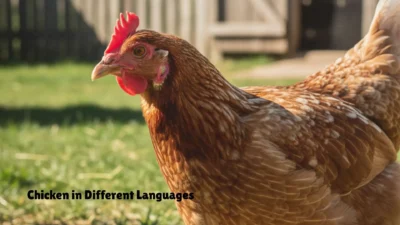Numbers are universal, but the way we speak them shows the beauty of every culture.
If you’ve ever wondered how to say five in different languages, this guide is made just for you.
Whether you’re learning a new language, traveling, or simply expanding your knowledge, knowing how to say “five” can open small but meaningful doors.
In this article, you’ll learn 70 translations of the number “five,” including simple pronunciations and examples that feel natural and easy to remember.
Let’s explore how the world counts together!
🌍 How to Say “Five” in 70 Different Languages
- English (🇺🇸) – Five | Pronunciation: fahyv
Example: I have five books. - Spanish (🇪🇸) – Cinco | Pronunciation: seen-ko
Example: Tengo cinco amigos. - French (🇫🇷) – Cinq | Pronunciation: sank
Example: J’ai cinq pommes. - German (🇩🇪) – Fünf | Pronunciation: fuenf
Example: Ich habe fünf Karten. - Italian (🇮🇹) – Cinque | Pronunciation: cheen-kweh
Example: Ho cinque penne. - Portuguese (🇵🇹) – Cinco | Pronunciation: seen-ko
Example: Tenho cinco moedas. - Mandarin Chinese (🇨🇳) – 五 (Wǔ) | Pronunciation: woo
Example: 我有五个。– I have five. - Japanese (🇯🇵) – 五 (Go) | Pronunciation: goh
Example: 五つあります。– There are five. - Korean (🇰🇷) – 오 (O) | Pronunciation: oh
Example: 다섯 개 있어요. – I have five. - Hindi (🇮🇳) – पाँच (Paanch) | Pronunciation: paanch
Example: मेरे पास पाँच किताबें हैं। - Urdu (🇵🇰) – پانچ (Paanch) | Pronunciation: paanch
Example: میرے پاس پانچ چیزیں ہیں۔ - Arabic (🇸🇦) – خمسة (Khamsa) | Pronunciation: kham-sa
Example: لدي خمسة أقلام. - Turkish (🇹🇷) – Beş | Pronunciation: besh
Example: Beş elmam var. - Russian (🇷🇺) – Пять (Pyat’) | Pronunciation: pyaht
Example: У меня пять монет. - Ukrainian (🇺🇦) – П’ять (P’yat’) | Pronunciation: pyaht
Example: У мене п’ять яблук. - Polish (🇵🇱) – Pięć | Pronunciation: pyench
Example: Mam pięć pytań. - Dutch (🇳🇱) – Vijf | Pronunciation: vayf
Example: Ik heb vijf katten. - Swedish (🇸🇪) – Fem | Pronunciation: fem
Example: Jag har fem böcker. - Norwegian (🇳🇴) – Fem | Pronunciation: fem
Example: Jeg har fem venner. - Danish (🇩🇰) – Fem | Pronunciation: fem
Example: Jeg har fem biler. - Finnish (🇫🇮) – Viisi | Pronunciation: vee-see
Example: Minulla on viisi koiraa. - Greek (🇬🇷) – Πέντε (Pente) | Pronunciation: pen-teh
Example: Έχω πέντε μήλα. - Hebrew (🇮🇱) – חמש (Chamesh) | Pronunciation: kha-mesh
Example: יש לי חמש שקיות. - Bengali (🇧🇩) – পাঁচ (Panch) | Pronunciation: panch
Example: আমার পাঁচ টাকা আছে। - Punjabi (🇮🇳) – ਪੰਜ (Panj) | Pronunciation: punj
Example: ਮੇਰੇ ਕੋਲ ਪੰਜ ਚੀਜ਼ਾਂ ਹਨ। - Tamil (🇮🇳) – ஐந்து (Aindhu) | Pronunciation: ine-thu
Example: எனக்கு ஐந்து புத்தகங்கள் உள்ளன. - Telugu (🇮🇳) – ఐదు (Aidu) | Pronunciation: eye-doo
Example: నాకు ఐదు పెన్లు ఉన్నాయి. - Kannada (🇮🇳) – ಐದು (Aidu) | Pronunciation: eye-doo
Example: ನನಗೆ ಐದು ಪುಸ್ತಕಗಳಿವೆ. - Malayalam (🇮🇳) – അഞ്ച് (Anchu) | Pronunciation: unchu
Example: എനിക്ക് അഞ്ച് ഉണ്ട്. - Sinhala (🇱🇰) – පහ (Paha) | Pronunciation: pa-ha
Example: මට පහක් තියෙනවා. - Nepali (🇳🇵) – पाँच (Paanch) | Pronunciation: paanch
Example: मेरो पाँच पुस्तक छन्। - Indonesian (🇮🇩) – Lima | Pronunciation: lee-ma
Example: Saya punya lima kucing. - Malay (🇲🇾) – Lima | Pronunciation: lee-ma
Example: Saya ada lima kawan. - Tagalog / Filipino (🇵🇭) – Lima | Pronunciation: lee-ma
Example: May lima akong laruan. - Vietnamese (🇻🇳) – Năm | Pronunciation: nahm
Example: Tôi có năm quyển sách. - Thai (🇹🇭) – ห้า (Hâa) | Pronunciation: haa
Example: ฉันมีห้าเล่ม. - Khmer (🇰🇭) – ប្រាំ (Pram) | Pronunciation: pram
Example: ខ្ញុំមានប្រាំ។ - Lao (🇱🇦) – ຫ້າ (Hā) | Pronunciation: haa
Example: ຂ້ອຍມີຫ້າ. - Mongolian (🇲🇳) – Тав (Tav) | Pronunciation: tav
Example: Надтай тав байна. - Kazakh (🇰🇿) – Бес (Bes) | Pronunciation: bess
Example: Менде бес нәрсе бар. - Uzbek (🇺🇿) – Besh | Pronunciation: besh
Example: Menda besh do‘st bor. - Turkmen (🇹🇲) – Bäş | Pronunciation: besh
Example: Mende bäş kitap bar. - Tajik (🇹🇯) – Панҷ (Panj) | Pronunciation: panj
Example: Ман панҷ дорам. - Pashto (🇦🇫) – پنځه (Panza) | Pronunciation: pan-za
Example: زه پنځه کتابونه لرم. - Persian (🇮🇷) – پنج (Panj) | Pronunciation: panj
Example: من پنج دارم. - Armenian (🇦🇲) – Հինք (Hink’) | Pronunciation: heenk
Example: Ի نزد ես հինք գիրք ունեմ։ - Georgian (🇬🇪) – ხუთი (Khuti) | Pronunciation: khoo-tee
Example: მე ხუთი მაქვს. - Azerbaijani (🇦🇿) – Beş | Pronunciation: besh
Example: Mənim beş dostum var. - Bosnian (🇧🇦) – Pet | Pronunciation: pet
Example: Imam pet stvari. - Serbian (🇷🇸) – Pet | Pronunciation: pet
Example: Имам пет књига. - Croatian (🇭🇷) – Pet | Pronunciation: pet
Example: Imam pet jabuka. - Slovenian (🇸🇮) – Pet | Pronunciation: pet
Example: Imam pet otrok. - Czech (🇨🇿) – Pět | Pronunciation: pyet
Example: Mám pět otázek. - Slovak (🇸🇰) – Päť | Pronunciation: pyet
Example: Mám päť kníh. - Hungarian (🇭🇺) – Öt | Pronunciation: ut
Example: Öt almám van. - Romanian (🇷🇴) – Cinci | Pronunciation: chin-chee
Example: Am cinci prieteni. - Bulgarian (🇧🇬) – Пет (Pet) | Pronunciation: pet
Example: Имам пет неща. - Albanian (🇦🇱) – Pesë | Pronunciation: peh-suh
Example: Kam pesë libra. - Latvian (🇱🇻) – Pieci | Pronunciation: pee-eh-tsee
Example: Man ir pieci draugi. - Lithuanian (🇱🇹) – Penki | Pronunciation: pen-kee
Example: Turiu penkis daiktus. - Estonian (🇪🇪) – Viis | Pronunciation: vees
Example: Mul on viis asja. - Swahili (🇰🇪) – Tano | Pronunciation: tah-no
Example: Nina vitu tano. - Zulu (🇿🇦) – Isihlanu | Pronunciation: ee-see-hla-noo
Example: Nginezinto ezinhlanu. - Xhosa (🇿🇦) – Hlanu | Pronunciation: hla-noo
Example: Ndine hlanu. - Hausa (🇳🇬) – Biyar | Pronunciation: bee-yar
Example: Ina da biyar. - Yoruba (🇳🇬) – Marun | Pronunciation: mah-roon
Example: Mo ní marun. - Amharic (🇪🇹) – አምስት (Amist) | Pronunciation: ah-mist
Example: አምስት አለኝ። - Somali (🇸🇴) – Shan | Pronunciation: shan
Example: Waxaan haystaa shan.
⭐ Conclusion
The number five may seem simple, but its expression across 70 languages shows the beautiful diversity of the world. From Asia to Africa, Europe to the Pacific, every culture counts “five” in its own special way. Whether you’re learning a new language or exploring global connections, these translations bring the world just a little closer.




